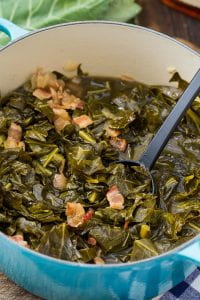Collard Greens. This leafy cabbage-like vegetable is a southern staple but is often a point of controversy around the dinner table. It seems that most people either foster a love or hate for this distinctive vegetable, with most children refusing to eat it, complaining about its horrible smell and all too healthy appearance.
This adaptable and highly nutritious vegetable is served across the world from East Africa to Southern and Eastern Europe, and most popularly the Southern United States. In the South, collard greens are most often prepared in a large pot and are cooked down in vinegar and water with smoked and salted meats along with any desired spices. They can be spicy, sweet, or a combination of the two, but recipes vary with each person that makes them.
For years collard greens have been eaten in the South but its origins actually lie in the Mediterranean. When the first Africans arrived in Jamestown, the Americas were introduced to this dark leafy green which would begin being eaten in homes across the South. In African cultures greens would be cooked down to a “low gravy” and then its juices were to be drunk. During times of enslavement, collard greens were among a very few vegetables that the enslaved were allowed to grow for themselves, and there began the deep-rooted tradition of cooked greens. Even after emancipation, collard greens remained an essential dish throughout the African American community and continued to be integrated into southern cuisine and culture.

So, whether you enjoy eating this controversial vegetable, or are among the people that find it utterly unappealing, it’s undeniable that collard greens were essential to the African community and have had a major impact on the South’s cuisine.

